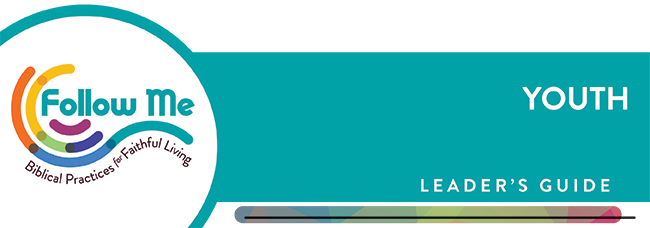 |
|
|
|
|
|
|
|
|
Follow Me: Biblical Practices for Faithful Living is a twenty-seven-unit curriculum based on practices Jesus did and taught us to do as faithful followers. Written for people of all ages who wish to live out their faith, this new curriculum examines where these practices are found in the Bible and how they have been used in Christian faith then and now.

The leader’s guide provides background information on each practice, a lesson plan for each session, resource pages for each session that may be reproduced, or used electronically with the participants in your congregation. The guide includes further background information for the leader on the practice through the Foundational Essay. For more information on the foundational essay check out the Congregational Guide.
The flow of the session:
- Getting Started provides an opening ritual for each session.
- Introducing the Practice invites participants to encounter an aspect of the practice.
- Finding the Practice in the Bible explores how the practice was lived by Jesus (Gospels), his faith tradition (Old Testament/Hebrew Scriptures), and his followers (New Testament).
- Finding the Practice Then and Now names how the practice has been lived out by Christians through the centuries.
- Practicing the Practice provides activities to try out the practice.
- Following Jesus sends participants out to follow Jesus.
|
|
 |
|
|
|
|
|
|
|
|
Explanation of Activity Symbols for Youth:
Symbols indicate the type of activity at a glance. Leaders can customize sessions by using what works best for their participants. Included in the Youth's Leader's Guide are symbols for the following: |
 |
Art: invites creativity in hands-on arts and crafts.
|
 |
Active/Movement: allows time for youth to move their bodies.
|
 |
Abstract Thinking: allows youth to reflect on concepts, such as grace, faith, and hope. Younger youth may find this challenging while older youth are able to think about objects, principles, and ideas not physically present.
|
 |
Conversation: allows time to talk and share thoughts, feelings, and questions.
|
 |
Concrete Thinking: focuses on the physical world and objects we can see. Generally, younger youth are more drawn to concrete thinking as their brains have not developed to grasp abstract concepts.
|
 |
Drama: uses skits and role play to engage with the story/practice.
|
 |
Game: allows for cooperative play.
|
 |
Music: engages youth with music and rhythm.
|
 |
Quiet/Contemplative: provides spaces and time for thought and reflection.
|
 |
Service: provides opportunities for youth to offer help to others.
|
 |
Technology: uses an internet-connected device.
|
 |
Extra Prep: requires additional time or materials. |
|
|
|
|
|
|
|
|
 |
|
|
|
|
|
|
|
|
Additional resources for youth found in the Congregational Guide.
- Intergenerational Session
- Café Discussion Guide
- Curriculum Connections
|
|
|
|
|
|
|
|
|
|
|
|
|
|
|
|
|
 |
Youth Leader's Guides |
|
|
 |
Small-Scale Packages |
|
|
|
 |
Large-Scale Packages |
|
|
|
|
|
|
|
|
|
|
|
|
|
|
|
|
|
|
|